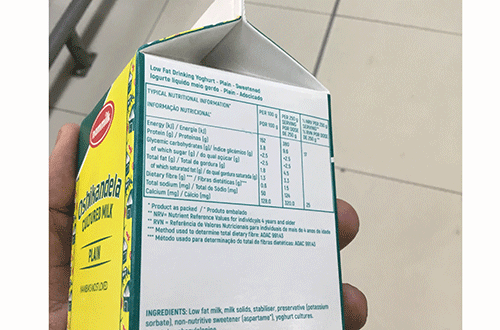Simaneka Mbeeli
Aspartame is an artificial sweetener. Manufacturers replace sugar with aspartame to produce sweet drinks that do not elevate blood sugar levels. This sweetener has been added to the category of possible carcinogens by the World Health Organisation. We have a few beverages on the market that are sweetened with aspartame and its derivatives. This piece of writing provides a brief breakdown of what this classification means to the consumers.
According to the International Agency for Research on Cancer, which is part of the WHO, a possible carcinogen is a substance that can cause cancer in experimental animals (with sufficient evidence), yet there is not enough evidence that it can cause cancer in humans. This artificial sweetener is not the only substance in this category – even our exposure to mobile phones is considered a possible carcinogen.
This sweetener can be found in the popular Coke Zero Sugar, M’Kane Tonic, Schweppes Ginger Ale and Oshikandela plain. Some manufacturers have indicated aspartame on the ingredient list by name, some may list it with a code e951, while others may indicate the specific derivatives.
Regulators, including the European Food Safety Authority, have deemed it safe. However, data from the joint FAO/WHO Expert Committee on Food Additives report estimate that it would take about 36 cans of Coke Zero consumed every day to put an adult person at risk.
Given that we consume these products occasionally, they may not pose an immediate life threat. That does not mean we should overdose these drinks with impunity, because we are exposed to other possible carcinogens, and we do not know enough about the combined effects.
On 15 May this year, the WHO updated its guidelines on non-sugar sweeteners. It warned against the use of the following non-nutritive sweeteners: aspartame, sucralose, saccharin, stevia, acesulfame K, advantame, cyclamates and neotame.
There is no evidence that these sweeteners are good for people with diabetes and those trying to manage weight in the long term.
In conclusion, it is the dose that kills – and for this reason, consumers should seek to understand their vulnerability to risk factors of chronic disease.
The best place to start is by asking medical doctors about unfamiliar ingredients in their food and how they may affect you.
* Simaneka Mbeeli is a health promoter, who helps people burn fat through the social enterprise Nam-FoodBIBLE.


